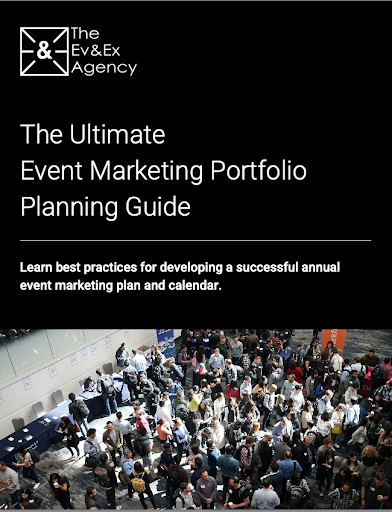We’ve all heard the old adage: “Failing to plan is planning to fail.” Annual planning for marketing events and experiences is absolutely crucial if you’re to expect them to succeed.
Planning goes far beyond organizing a calendar; it’s a strategic imperative that lays the groundwork for a calendar packed with alignment, synergy and growth. Any marketer must approach annual planning with determination and focus to ensure success and leverage every opportunity that presents itself.
In our first post in this series, we looked at what elements belong in an event portfolio plan. Now, let’s look at the seven sizable benefits you’ll see from putting one together. To learn even more, download our expert guide to event portfolio planning.
1. Efficient Resource Allocation
The primary goal of event marketing annual planning is to ensure that resources are allocated effectively. By identifying high-impact marketing efforts early, time, budget, and personnel can be focused on initiatives that drive results.
This proactive approach not only reduces wasted effort but also maximizes returns, ensuring that clients receive the best possible value for their investment. By anticipating potential challenges and implementing strategic solutions in advance, you can create a more efficient workflow that ultimately leads to greater satisfaction and performance.
This enhances decision-making processes and fosters stronger internal and external relationships among all stakeholders, allowing for better, more efficient and effective events and experiences.
Since many are forecasting significant budget growth for event marketing, planning how you’ll deploy your resources becomes even more important. Budget growth directly relates to annual event marketing planning because increased budgets require a strategic approach to allocate resources effectively.
2. Establishing Thought Leadership and Trust
It’s not just about capturing the attention of prospects. It’s important to know that event marketing annual planning offers you, as a marketer, a valuable opportunity to establish trusted partnerships with stakeholders and vendors that help actualize the benefits of delivering exceptional experiences.
Through the in-depth discussions and strategic guidance that are part of the planning process, you can crystallize everyone’s understanding of your business goals and objectives. This fosters unity based on trust and shared purpose, reinforcing your internal and external team’s commitment to success.
It also helps you rigorously plan and define the messaging you’ll deploy at your events and experiences. Message discipline and the quality of your communication are vital to enforcing the impression within your target audience that you’re a leader in your segment.
3. Maintaining or Growing Event Marketing Investment
Maintaining or growing your event marketing budget is clearly desirable for most marketing departments, and it hinges on the ability to demonstrate current successes and their impact on overall business objectives.
A well-planned event calendar will result in better-executed events that deliver better outcomes. By showcasing tangible results from recent and current campaigns—such as increased brand awareness, customer engagement, and lead generation—marketers can effectively make the case for additional investment.
Your annual planning process should acknowledge the return on investment (ROI) of past events but also illustrate the potential of future initiatives. Establishing a track record of success creates a compelling narrative that encourages stakeholders to allocate more resources, fostering a culture of confidence in the value of event marketing.
4. Aligning Goals and Strategies
Alignment among stakeholders is essential for fostering collaboration and driving shared success. When everyone—from leadership to team members to key vendors and partners—works together, it facilitates effective communication and teamwork.
Engaging in event marketing annual planning enhances this alignment by creating a structured platform for synchronizing goals, strategies, and priorities. This inclusive approach ensures that diverse perspectives are considered, leading to more comprehensive planning.
With a unified roadmap, organizations can craft cohesive campaigns more efficiently while minimizing miscommunication. This clarity also simplifies measuring progress, as clearly defined metrics allow for evaluating initiatives effectively.
Synchronized planning and stakeholder commitment to events and experiences create a culture of collaboration, setting up your organization to achieve meaningful, measurable results.
5. Supporting Business and Brand Initiatives
By identifying key business and brand goals during the event marketing annual planning process, organizations can ensure that upcoming initiatives are effectively supported and aligned with their broader business objectives. This approach leades to cohesive and focused calendar of activities that not only address immediate needs but can also unlock downstream challenges and opportunities.
Whether it’s launching a new product, expanding into a new market, or enhancing brand perception among target audiences, an annual plan can be meticulously tailored around these objectives. Customization like this ensures that every event or experience is purpose-driven and measurable, enhancing its potential for success.
Moreover, by bringing together cross-functional teams during the planning phase, insights from different stakeholders can be integrated, leading to more innovative solutions. This fosters creativity and provides a variety of perspectives, which can contribute to richer, more impactful experiences that not only engage customers for immediate results but also forge lasting relationships between them and your brand. The impact of events and experiences can be indelible, making them one of the most powerful branding tools in your marketing arsenal.
6. Forecasting Financial and Resource Needs
Financial forecasting and budget prioritization are crucial for effective event marketing annual planning. They permit a truly strategic allocation of funds so that each dollar is spent with a clear purpose. By analyzing past expenditures and predicting future opportunities or trends, you can create accurate budgets that align with your business goals.
Moreover, careful planning anticipates staffing and resource needs, so you can manage timelines effectively and minimize last-minute challenges. A well-structured financial plan spots potential cost savings, allowing you to reallocate those savings to higher-priority initiatives.
Ultimately, this enhances the chance of successful outcomes and ensures that each event contributes appreciable results.
7. Fostering Ongoing Collaboration and Innovation
Event marketing annual planning isn’t just a top-down process; as we’ve mentioned, it’s an opportunity for collaboration across teams and stakeholders..
By involving internal stakeholders and outside marketing agencies and vendors, you’re creating a forum where ideas can be shared, optimized, and implemented. This is a more productive procedure. Plus, if you bake it into your planning process, it’s now a repeatable process that keeps delivering outstanding campaigns long into the future.
One bonus? Good annual planning doesn’t remove agility; in our view, it adds it by creating strong working relationships that are much more capable of responding to disruption or opportunity. Ironically, the team that has a good, long-view understanding of where it wants to go is better equipped to deal with anything unexpected.
Summary: The Value of Annual Planning
Event marketing annual planning demands more than a mere checklist of tasks; it requires a definitive vision for the future. It’s crucial to allocate resources efficiently, foster unwavering trust within the team, and align on clear objectives. By doing so, your event team, along with your agencies and resource providers, will be fully equipped to tackle the challenges and seize the opportunities that lie ahead.
Through proactive communication and a commitment to collaboration, you’ll create unforgettable experiences that not only meet expectations but also elevate them. So, a higher level of strategic planning is essential for ensuring that your events and initiatives achieve extraordinary success. It’s time to embrace a mindset of excellence and take decisive action to wring the most from your event and experietial portfolio.
Looking for a proven expert to help with planning and execution? Let us know what you need!


